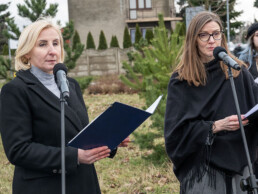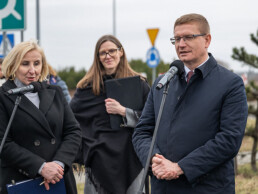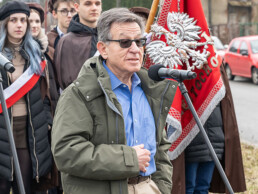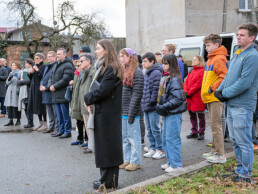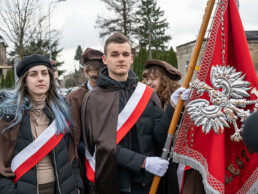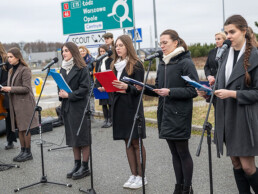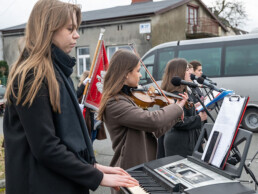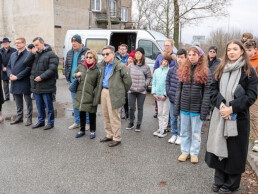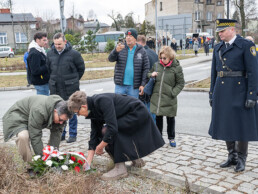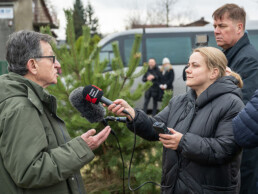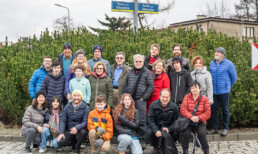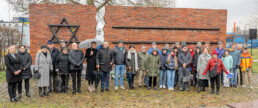Source: Text – Alan Silberstein, Photographs – Marcin Szpadrowski
Częstochowa Roundabout Named in Honour of Leon Silberstein z”l
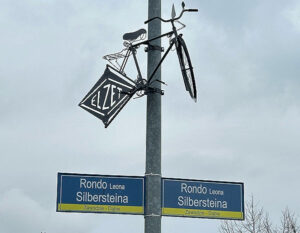 Twenty relatives and descendants of Leon Silberstein z”l, from the United States and Israel gathered in Częstochowa, together with city officials and civic leadership, to commemorate Silberstein’s heroism, as a partisan, who saved hundreds from death during the Holocaust. The ceremony was held at the Leon Silberstein Roundabout (Pol. Rondo) named in his honour by the Częstochowa City Council in April 2023.
Twenty relatives and descendants of Leon Silberstein z”l, from the United States and Israel gathered in Częstochowa, together with city officials and civic leadership, to commemorate Silberstein’s heroism, as a partisan, who saved hundreds from death during the Holocaust. The ceremony was held at the Leon Silberstein Roundabout (Pol. Rondo) named in his honour by the Częstochowa City Council in April 2023.
The commemoration was officiated by Katarzyna Ozimek, Director of the Częstochowa Museum. Other speakers included Częstochowa Mayor Krzysztof Matyjaszczyk, Deputy Mayor Ryszard Stefaniak, Deputy Chairman of the City Council Łukasz Kot, head of the Centre for Documentation of the History of Częstochowa Dr. Juliusz Sętowski and Leon’s son Alan Silberstein.
During the event, those assembled heard students of the Juliusz Słowacki High School sing
the Jewish Partisan anthem (“Zog Nit Kayn Mol“) in Polish, English and Yiddish.
Following the Rondo dedication, a memorial service was held at the Częstochowa Holocaust Monument, at Samuel Willenberg Square. The ceremony was officiated by Izabela Sobańska-Klekowska, Chair of the Częstochowa branch of the Social-Cultural Association of Jewish in Poland (TSKŻ). Prayers were recited and wreaths were laid.
The Leon Silberstein Story:
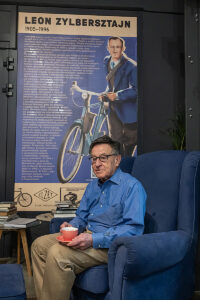 In the decade before the war, Leon and Rose Silberstein created a thriving factory, which made bicycle parts and accessories. When the Germans occupied the city and took over his factory, Silberstein persuaded the German authorities that he should be employed to maintain and renovate civilian infrastructure in the area into which the German officers were moving. To assist with this work, he was authorised to recruit some twenty craftsmen in different trades (e.g. electrical, carpentry, plumbing, draperies, locksmith), who were assigned to locations throughout the city. To be able to supervise his workforce, Silberstein used a bicycle to travel freely, one of the few Jews so permitted. The bicycle was a symbol of his authority.
In the decade before the war, Leon and Rose Silberstein created a thriving factory, which made bicycle parts and accessories. When the Germans occupied the city and took over his factory, Silberstein persuaded the German authorities that he should be employed to maintain and renovate civilian infrastructure in the area into which the German officers were moving. To assist with this work, he was authorised to recruit some twenty craftsmen in different trades (e.g. electrical, carpentry, plumbing, draperies, locksmith), who were assigned to locations throughout the city. To be able to supervise his workforce, Silberstein used a bicycle to travel freely, one of the few Jews so permitted. The bicycle was a symbol of his authority.
What the Germans never learned was that his team was acting undercover as a brigade of the Jewish partisans. They gathered information, conducted sabotage, identified traitors and carried out executions, often in cooperation with the Armia Krajowa (Home Army) and Armia Ludowa (People’s Army). They also saved hundreds of Jews, hiding them in bunkers and attics, transporting them out of the ghetto, or into the HASAG labour camp following the liquidation of the ghetto.Silberstein’s group was given the task of bringing furniture from Jewish apartments after the liquidation. In those apartments, they often found Jews in hiding with no way to flee to safety. These survivors were hidden in the wagons carrying the furniture to the Möbellager warehouse, where they found refuge in the attic. Among the Jewish children hidden in that attic were his nephews Jacob Shacharon and Sigmund Rolat.
Częstochowa Mayor Krzysztof Matyjaszczyk and City Council Deputy Chair Łukasz Kot learned Silberstein’s story, when they traveled to New York City in 2022, to accept the United Nations “World Bicycle Day” Award for their initiatives to make Częstochowa “bicycle friendly.” Hearing of the reason for their trip, Sigmund’s son, Geoffrey Rolat, told them about his uncle’s war-time activities and the importance of bicycles in his life. Upon returning to Poland, they considered how to honour his heroism, which was verified by the Centre for Documentation of the History of Częstochowa. In April 2023, Częstochowa City Council Vice-Chair Jolanta Urbańska proposed to name the Rondo, which connects to the World Bicycle Day Bridge over the Warta River, the “Leon Silberstein Rondo”. The proposal was approved.

